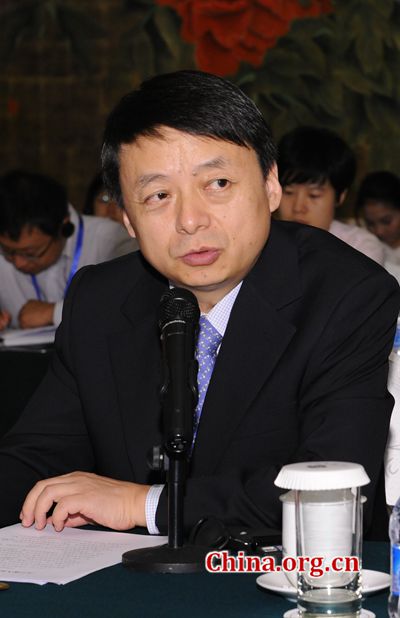Scholars air views on anti-corruption in Beijing
- By Li Shen
 0 Comment(s)
0 Comment(s) Print
Print E-mail China.org.cn, September 14, 2015
E-mail China.org.cn, September 14, 2015
|
Ma Huaide, vice president of China University of Political Science and Law, delivers a speech during the panel discussions at the "The Party and World Dialogue 2015" opening in Beijing on Sept. 8. [Photo/ Zhang Zhe] |
Ma Huaide, vice president of China University of Political Science and Law, pointed out that China's current achievements in cracking down on corruption only marked a first step in a long-term fight. To forge a social environment in which officials cannot or do not want to act corruptly, he emphasized the role of transparency and openness in social management and use of power.
Therefore, he suggested to formulate intra-party regulations on openness of party affairs, to establish a report system on personal matters and assets of public servants and to upgrade the regulation on the disclosure of government information into a state law.
Hahm Chaibong, president of the Asan Institute for Policy Studies in South Korea, compared Western views with Confucianism on politics. Differing from Westerners, who believe that human beings by nature follow self-interest, Confucians believe that human being can achieve disinterested perfection.
So without people who are trying to make themselves perfect in regard to the virtues, no institutions or governments can prevent corruption. In his opinion, the rule of law in China is guaranteed by the rule of the virtuous person and the virtuous party.
"We need good systems and virtues in curbing corruption. One of the CPC's focus in the campaign is education," Hahm said. "While in the West, the downfall of the liberal education, the humanistic education, the sense of public service is really sad. And that is what the West should try to recover."
Eamon Gilmore, former deputy prime minister and minister for foreign affairs and trade of Ireland, pointed out that both the receiver and the giver of the bribes should be the focus and the legislation should be introduced to ensure the registration of lobbyists. He also called attention to the corruption in the private sector and between the media and the private sector.
On supervising the supervisors, Zhuang Deshui, deputy director of the Clean Government Studies Center of Peking University, said that self-supervision is the guarantee of the CPC's long-term rule. He suggested building a triparty supervision system among the party committee, the discipline inspection commission and ordinary party members to ensure the operation of intra-party democracy, enhance openness of party affairs and education for cadres regarding interests.
Kjeld Brodsgaard, director of the Asia Research Center, is from Denmark, one of the most uncorrupt countries in the world according to Transparency International. He argued that a "high salary cannot maintain clean government" as the salary of public servants in Denmark is much lower than that in Singapore. But he did agree that transparency, morality of politicians, accountability system and legal supervision are crucial for effective supervision.
With a theme of "To Discipline the Party: Responsibility of the Party," the dialogue was sponsored by China's Center for Contemporary World Studies, or the CCCWS, and the International Cooperation Department of the Central Commission for Discipline Inspection, the CCDI of the CPC.
The four-day event showcased modern international perspective on the best ways for ruling parties to "keep power reined within the cage of regulations," how to enhance rule-based party governance and build a global corruption prevention network.







Go to Forum >>0 Comment(s)